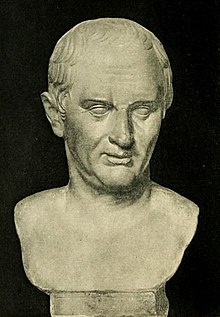De natura deorum
De natura deorum (Of the essence of the gods) is the title of one around 45 BC. A work written in Latin by the Roman statesman, writer and philosopher Marcus Tullius Cicero , in which fundamental questions of faith from the point of view of the three most important ancient schools of philosophy - the Stoics , the Epicureans and the academics - are discussed in a dialogue .
content
The work, which consists of three books and is dedicated to Brutus , is essentially the transcription of a philosophical conversation that took place around 30 years earlier, around 76 BC. In the house of Cotta's friend, Cicero. In the work, the participants in the conversation, M. Tullius Cicero, Quintus Lucilius Balbus, Gaius Velleius and Gaius Aurelius Cotta , speak one after the other, with Cicero, who was around 30 years old at the time, mainly acting as the listener. C. Velleius represents the Epicurean School, Q. Balbus represents the Stoics, and C. Cotta speaks for the academic skeptics , to which Cicero was also a member. In the first book, after the introduction by Cicero, there is Velleius' view of the Epicurean school as well as Cotta's criticism of it. In the second book follows the presentation and defense of the stoic theory by Balbus and in the third book, Cotta's criticism of the stoic view of the Balbus follows.
reception
The work had a strong influence on thinkers, especially in the 18th century. From Voltaire states that he De Natura Deorum have called "perhaps the best book in the entire Ancient". In his dialogues on natural religion, David Hume formally borrowed from Cicero's work, letting a student of Cleanthes (head of the Stoa, Hume representative of natural religion) act as the listener to the conversation and hiding his opinion behind that of the skeptic Philo.
In 1811 an Italian minorite priest named Seraphinus supposedly published the fourth volume of De natura deorum , which he claimed to have found in a codex. In reality, the manuscript was published by the JE Hitzig publishing house in Berlin, with the Protestant preacher Hermann Heimart Cludius probably being the author.
Editions and translations
- Cicero: Philosophical writings / De natura deorum. Aschendorff's collection of Latin and Greek classics, ISBN 978-3-402-02043-2
- Cicero: De Natura Deorum. About the nature of the gods. Latin / German, translated and edited. v. Ursula Blank-Sangmeister, Reclam, Stuttgart 1995, ISBN 978-3-15-006881-6
- Cicero: On the essence of the gods / De natura deorum. Latin – German, translated by Olof Gigon and Laila Straume-Zimmermann, Akademie Verlag, ISBN 978-3-05-005452-0
literature
- Reinhold F. Glei : Cicero. C. De natura deorum. In: Christine Walde (Ed.): The reception of ancient literature. Kulturhistorisches Werklexikon (= Der Neue Pauly . Supplements. Volume 7). Metzler, Stuttgart / Weimar 2010, ISBN 978-3-476-02034-5 , Sp. 245-252.
Web links
Remarks
- ↑ Reinhold F. Glei : Cicero's lost doctrine of gods , Trier 2008.


